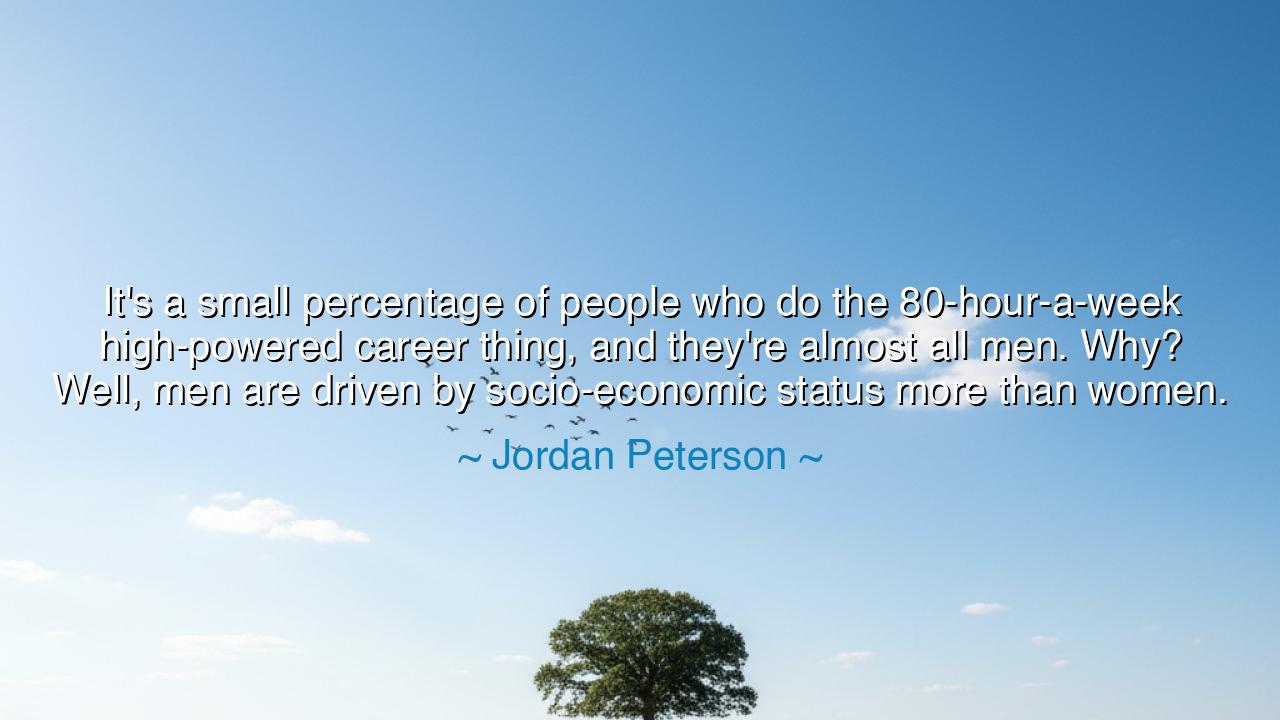
It's a small percentage of people who do the 80-hour-a-week
It's a small percentage of people who do the 80-hour-a-week high-powered career thing, and they're almost all men. Why? Well, men are driven by socio-economic status more than women.






Hear, O seekers of truth, the stark words of Jordan Peterson: “It’s a small percentage of people who do the 80-hour-a-week high-powered career thing, and they’re almost all men. Why? Well, men are driven by socio-economic status more than women.” In this saying he names an ancient truth about ambition, sacrifice, and the burdens of labor. He reminds us that the pursuit of status has long been the consuming fire of men, while women have often been bound by other measures of life and worth.
For the 80-hour-a-week career is no gentle path. It devours time, family, and leisure, demanding nearly all of a person’s life. Few are willing—or able—to endure such relentless toil, and those who do are most often men. Why? Because Peterson sees that men, across history and culture, have been driven to prove themselves by climbing the ladder of socio-economic status, measuring their value by wealth, achievement, and rank.
History bears this out. In the age of industrialization, men flooded the factories and mines, working impossible hours not merely to survive but to gain dignity, recognition, and the hope of rising higher. Many died young, their bodies broken, but still the hunger for status drove them on. Women, though they too worked, were more often chained by expectation to the hearth, where their worth was measured not in wealth, but in care and continuity. Thus the lines of ambition were drawn, not always by choice, but by the forces of culture and survival.
Yet there are exceptions that illuminate the truth further. Consider Madam C.J. Walker, who in America rose from poverty to become the first self-made woman millionaire. She worked tirelessly, not for recognition from men, but to build independence for herself and opportunity for others. Her story shows that when women do choose the grueling path of high-powered careers, it is often not for status alone but for liberation, legacy, and the uplifting of others.
Therefore, O children of the future, let this be your wisdom: the hunger for status is powerful, but it is not the only measure of greatness. Men may burn themselves in pursuit of titles and riches, while women, less bound by that hunger, may carry other forms of wealth—community, nurture, endurance. Peterson’s words are both observation and warning: that the sacrifices demanded by ambition are immense, and that to chase socio-economic power alone may gain the world yet cost the soul.






QNtran khanh quynh nhu
Peterson’s observation about men’s drive for socio-economic status is a fascinating point, but I’m not entirely convinced. Could it be that women have been less encouraged to pursue high-powered careers and thus may not have had the chance to show the same level of drive? If women had more equal access to these career paths, could we see the same intensity of dedication? I wonder if the real issue lies in the opportunity gap.
HAbui hoang anh
I find Peterson’s comment interesting, but I wonder if it underestimates the influence of societal norms. Are women really less driven by socio-economic status, or are they simply steered toward different career paths and life choices? If women had more equal opportunities to pursue high-powered careers, would their motivation levels be similar to men’s? Could the imbalance be rooted in how both genders are socialized rather than inherent differences in drive?
XNNguyen Xuan Nghi
Peterson’s idea that men are more driven by socio-economic status than women could be true, but I think it oversimplifies the issue. How much of this is about the external pressures placed on men to achieve high socio-economic status? Could it also be that women have been conditioned to view success differently, focusing more on family or community over career? It’s worth considering if changing these expectations could shift the narrative.
DT38_Nguyen Dinh Trong
I’m not sure I agree with Peterson’s reasoning that men are driven by socio-economic status more than women. Could it also be that societal expectations shape these gendered career patterns? Men may feel more pressure to work those 80-hour weeks to maintain a certain status, but does that necessarily mean they’re more driven? It seems like women might be just as capable but are often socialized to seek different kinds of fulfillment.
TTNguyen Thanh Tung
Peterson’s claim that men are more driven by socio-economic status is an interesting one, but I think it overlooks the broader societal context. How much of this drive is shaped by social expectations or pressure to succeed? If women were equally encouraged to pursue high-powered careers in the same way, would they not also become highly motivated by socio-economic status? It feels like a question of socialization more than biology.